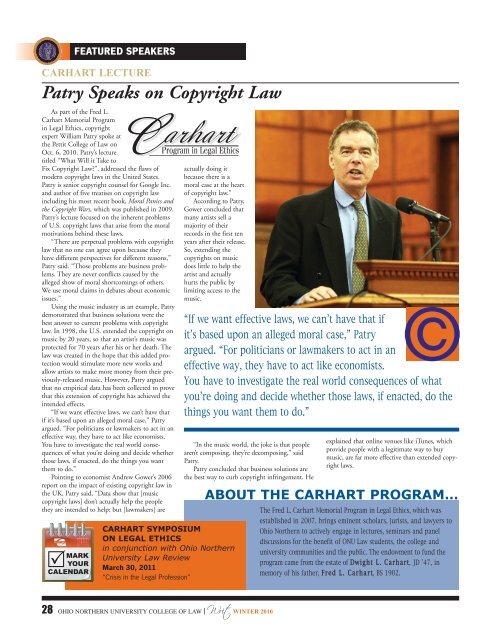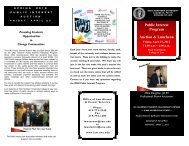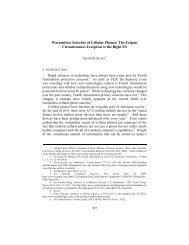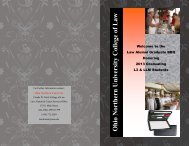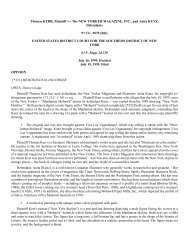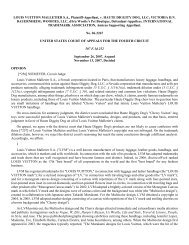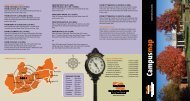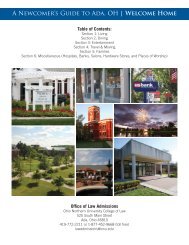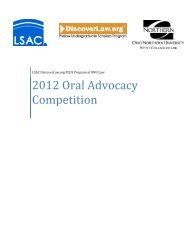Writ 2010 - Ohio Northern University Pettit College of Law
Writ 2010 - Ohio Northern University Pettit College of Law
Writ 2010 - Ohio Northern University Pettit College of Law
Create successful ePaper yourself
Turn your PDF publications into a flip-book with our unique Google optimized e-Paper software.
FEATURED SPEAKERS<br />
CARHART LECTURE<br />
Patry Speaks on Copyright <strong>Law</strong><br />
As part <strong>of</strong> the Fred L.<br />
Carhart Memorial Program<br />
in Legal Ethics, copyright<br />
expert William Patry spoke at<br />
the <strong>Pettit</strong> <strong>College</strong> <strong>of</strong> <strong>Law</strong> on<br />
Oct. 6, <strong>2010</strong>. Patry’s lecture<br />
titled “What Will it Take to<br />
Fix Copyright <strong>Law</strong>?”, addressed the flaws <strong>of</strong><br />
modern copyright laws in the United States.<br />
Patry is senior copyright counsel for Google Inc.<br />
and author <strong>of</strong> five treatises on copyright law<br />
including his most recent book, Moral Panics and<br />
the Copyright Wars, which was published in 2009.<br />
Patry’s lecture focused on the inherent problems<br />
<strong>of</strong> U.S. copyright laws that arise from the moral<br />
motivations behind these laws.<br />
“There are perpetual problems with copyright<br />
law that no one can agree upon because they<br />
have different perspectives for different reasons,”<br />
Patry said. “Those problems are business problems.<br />
They are never conflicts caused by the<br />
alleged show <strong>of</strong> moral shortcomings <strong>of</strong> others.<br />
We use moral claims in debates about economic<br />
issues.”<br />
Using the music industry as an example, Patry<br />
demonstrated that business solutions were the<br />
best answer to current problems with copyright<br />
law. In 1998, the U.S. extended the copyright on<br />
music by 20 years, so that an artist’s music was<br />
protected for 70 years after his or her death. The<br />
law was created in the hope that this added protection<br />
would stimulate more new works and<br />
allow artists to make more money from their previously-released<br />
music. However, Patry argued<br />
that no empirical data has been collected to prove<br />
that this extension <strong>of</strong> copyright has achieved the<br />
intended effects.<br />
“If we want effective laws, we can’t have that<br />
if it’s based upon an alleged moral case,” Patry<br />
argued. “For politicians or lawmakers to act in an<br />
effective way, they have to act like economists.<br />
You have to investigate the real world consequences<br />
<strong>of</strong> what you’re doing and decide whether<br />
those laws, if enacted, do the things you want<br />
them to do.”<br />
Pointing to economist Andrew Gower’s 2006<br />
report on the impact <strong>of</strong> existing copyright law in<br />
the UK, Patry said, “Data show that [music<br />
copyright laws] don’t actually help the people<br />
they are intended to help; but [lawmakers] are<br />
� MARK<br />
YOUR<br />
CALENDAR<br />
actually doing it<br />
because there is a<br />
moral case at the heart<br />
<strong>of</strong> copyright law.”<br />
According to Patry,<br />
Gower concluded that<br />
many artists sell a<br />
majority <strong>of</strong> their<br />
records in the first ten<br />
years after their release.<br />
So, extending the<br />
copyrights on music<br />
does little to help the<br />
artist and actually<br />
hurts the public by<br />
limiting access to the<br />
music.<br />
CARHART SYMPOSIUM<br />
ON LEGAL ETHICS<br />
in conjunction with <strong>Ohio</strong> <strong>Northern</strong><br />
<strong>University</strong> <strong>Law</strong> Review<br />
March 30, 2011<br />
“Crisis in the Legal Pr<strong>of</strong>ession”<br />
©<br />
“If we want effective laws, we can’t have that if<br />
it’s based upon an alleged moral case,” Patry<br />
argued. “For politicians or lawmakers to act in an<br />
effective way, they have to act like economists.<br />
You have to investigate the real world consequences <strong>of</strong> what<br />
you’re doing and decide whether those laws, if enacted, do the<br />
things you want them to do.”<br />
“In the music world, the joke is that people<br />
aren’t composing, they’re decomposing,” said<br />
Patry.<br />
Patry concluded that business solutions are<br />
the best way to curb copyright infringement. He<br />
28 OHIO NORTHERN UNIVERSITY COLLEGE OF LAW | <strong>Writ</strong> WINTER <strong>2010</strong><br />
explained that online venues like iTunes, which<br />
provide people with a legitimate way to buy<br />
music, are far more effective than extended copyright<br />
laws.<br />
ABOUT THE CARHART PROGRAM…<br />
The Fred L. Carhart Memorial Program in Legal Ethics, which was<br />
established in 2007, brings eminent scholars, jurists, and lawyers to<br />
<strong>Ohio</strong> <strong>Northern</strong> to actively engage in lectures, seminars and panel<br />
discussions for the benefit <strong>of</strong> ONU <strong>Law</strong> students, the college and<br />
university communities and the public. The endowment to fund the<br />
program came from the estate <strong>of</strong> Dw ight L . C arh art, JD ’47, in<br />
memory <strong>of</strong> his father, Fred L . C a r h a r t, BS 1902.


